from PASSING THRU
At 16 years of age and in my junior year of high school, I researched and wrote a story about the one thousand mile horse race between Chadron, Nebraska and Chicago that had taken place in 1893. The event was dreamed up as a promotional stunt to familiarize Chicago businesses with northwest Nebraska. Buffalo Bill would greet the winner upon arrival in Chicago and award him with a pair of gold-handled pistols. The stunt wasn’t without controversy when Chadron race-officials, decided against paying the additional award-money of a thousand dollars when they accused the winner of cheating by covering some of the distance via a railroad car of the Chicago and Northwestern railway.
My account of the race was featured in several newspapers, including the Omaha World Herald and the Rapid City Daily Journal. Both newspapers began courting me to cover local news for them in northwest Nebraska. Child labor laws were not a problem in the days many a family’s youngsters work long hours in the harvest fields of the ranch country. I convinced both I could do the job and by the start of my senior year, I was officially the northwest Nebraska scribe for both newspapers.
In the summer of 1954, I accepted a summer job at the Gering Courier at Gering, Nebraska. I was excited to work inside the newspaper plant itself, something I had not done at the World Herald or the Journal. The publisher, Warren C. Wood also served as commandant of the Nebraska National Guard with a rank of Major General. It was with his help that I learned the job wasn’t limited to gathering and writing the news. Long before computers were available, the melting of lead and setting of type was part of the job. Sweeping the floors at the end of the day and unloading heavy rolls of paper soon would grow old as I eagerly looked forward to returning to Chadron for my final year of high school. “The General” as he preferred being called, was a personal friend of President Dwight D. Eisenhower. They had served together during World War II in Europe. Almost immediately upon my arrival I was told to never interrupt when the publishers door was closed, as he was probably on the phone with Washington D.C., perhaps even talking to the President.
Returning to my final year of high school, I was named editor of the school newspaper.
The school yearbook of my senior year predicted I would be editor of my own newspaper.
Within days of graduation, I caught a Trailways bus for California with a stop off in Gering to visit with General Wood. As luck would have it, he was driving to Denver the following day to conduct business at the Denver Post and offered me a ride with a chance to witness the inside workings of a really big newspaper. It was the first time I actually saw an electric typewriter being used. The continuation of my trip to California became clouded as I envisioned being a cub reporter for the Post. However, events of that day would soon overshadow my thoughts when General Wood invited me to join him in visiting President Eisenhower, who he explained was in Denver vacationing at the home of the first lady’s parents.
The youthful rock n roll’ rebellion of the late 1950’s had yet to take place. A quieter America was in vogue requiring only a lone secret service agent sitting across the street in a car to guard the world’s most powerful man. General Wood and I approached the front door unencumbered. Answering the door himself, Ike was shorter than his wartime friend. “Woody, thanks for coming” said the President offering his hand to shake. I took a few steps away from the two and as I turned to look at the view from the porch, the general introduced me saying, “Mr. President, this is Johnny Rook, one of my boys at the newspaper”. Nodding in my direction and holding up a folded newspaper in his left land, “you’re in the right business young man”, displaying that famous wide Ike smile as he turned to usher his friend inside.
Turning my way General Wood nodded, “Make your self comfortable”, encouraging me to have a seat on the front porch swing. The porch and neighborhood of the Eisenhower kin was somewhat like ours in Nebraska, in a larger fashion.
I had been advised beforehand the meeting with the President would be brief and it was.
Within minutes the general returned by himself and motioned for me to follow, down the steps returning to the car.
As we drove away General Wood patted his suit pocket as though checking to make sure it’s contents were intact. My mind raced with thoughts of his being a courier of some sort on behalf of the President. Hoping to break the silence I mentioned, the President appeared older. With the general offering, “It’s a tough job, being President, I wouldn’t want it”. Adding, Eisenhower was guided by a discipline that originated with his parents who where immigrants from Germany. The democrat turned republican was the right man for the time with most voters agreeing, “I Like Ike”.
“Oh, he has a temper, and can swear like a trooper with the best of them” said the general. “Never, with women around though”. He continued, explaining the pressure of the presidency was immense with “problems only he could know about”.
Just a few weeks later, walking down a sidewalk in Santa Monica, I was startled to hear a street corner newspaper vendor shouting to the world, “Ike hospitalized in Denver”. The concern given by General Wood had become a reality, as I consumed the newspaper for all the news possible about our ailing President. He had been rushed to Fitzsimmons Veterans Hospital and placed in an oxygen tent. Stricken by a heart attack in the same house I had visited. I hurried to my apartment to re-read the paper and search the radio dial for any information on the president. Without a TV, we also didn’t have all news radio in those days, so we were trained to expect news at the top of every hour. Hours seemed to tick by in a period of minutes waiting for the news in an era when most would get their news via print, not telecommunications.
President Eisenhower
Dwight Eisenhower, our 34th President survived several heart attacks, finishing his second term leaving office judged by most as having done a good job. Ten years later in 1969 he died in Washington D.C.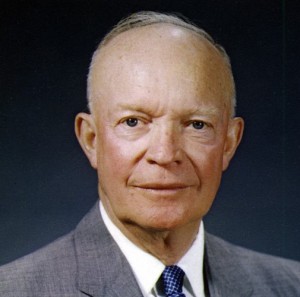
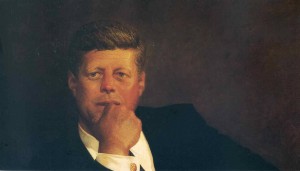 Richard Nixon walked into the republican convention claiming his right to sit at the head of the table, having been Ike’s #2. His years as vice president had claimed its share of controversy by a press ignoring Eisenhower’s stumbles in adultery. Mamie was seldom heard, almost the exact opposite of Eleanor Roosevelt, who seemed more like a Vice President than a first lady. Nixon seemed always pestered by the press of the eastern establishment. Never seeming to appreciate the threat of a President who hailed from the west, attention was given to Pat Nixon’s red cloth coat, Checkers - the family dog and rumors of Nixon’s beholding to Howard Hughes. Labeled “Tricky Dickie” by the press and without a solid endorsement from Eisenhower, Nixon would enter a campaign with baggage and being more vulnerable to the black and white cameras of TV news. It would be the first time television was said to be important to the selling of a president.
Richard Nixon walked into the republican convention claiming his right to sit at the head of the table, having been Ike’s #2. His years as vice president had claimed its share of controversy by a press ignoring Eisenhower’s stumbles in adultery. Mamie was seldom heard, almost the exact opposite of Eleanor Roosevelt, who seemed more like a Vice President than a first lady. Nixon seemed always pestered by the press of the eastern establishment. Never seeming to appreciate the threat of a President who hailed from the west, attention was given to Pat Nixon’s red cloth coat, Checkers - the family dog and rumors of Nixon’s beholding to Howard Hughes. Labeled “Tricky Dickie” by the press and without a solid endorsement from Eisenhower, Nixon would enter a campaign with baggage and being more vulnerable to the black and white cameras of TV news. It would be the first time television was said to be important to the selling of a president.
The nominee of the democrats was a fresh new face with the look of a movie star, John F. Kennedy. His only baggage was his religion. As a Catholic, would the Pope control him?
With a quick wit and a handsome, almost shy smile, he would steal the presidency from Nixon’s grasp, with the help of television and a vote controlled by the Chicago underground.
In the fall of 1959, John Rook had become Johnny Rowe, a disc jockey with KTLN in Denver. The campaign for President of John F. Kennedy brought him to Denver where he was scheduled to speak from the steps of the state capital building. The beautiful sunny day invited me to join an overflow crowd in welcoming him to Colorado.
Nearing the capital building, I could see my arrival had been timed too late. The packed crowd overflowed into the side streets, which was as close as I could advance. My disappointment was short lived when the siren of a police escort approached leading a car with the candidate inside. I could hardly believe my eyes as the caravan came to a stop within a few feet of me standing on the curb. Opening the door himself, John Kennedy stepped from the back seat and almost immediately offered his hand for me to shake.
“Good luck to you sir”, I said as the President to-be nodded saying, “with your help”. He was a strikingly handsome man with a golden tan. Smiling, he slowly advanced toward a podium through an opening created by local Denver policemen. I joined the overflow crowd in applauding his short speech and weeks later voted for the democrat from Massachusetts.
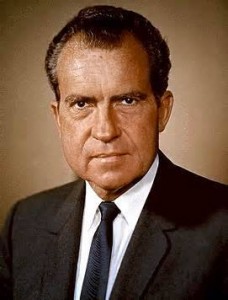 Within a few weeks, Vice President Richard M. Nixon also arrived in Denver to campaign for the Presidency. I was sent to the Brown Palace Hotel to join a pool of newsmen for an interview. I arrived just in time to see a convertible with Nixon in the back seat, pull up in front of the hotel. Upon exiting the car he immediately directed a tirade of profanity at a secret service man near him. I did not know what had created his verbal display of anger, but he seemed slightly embarrassed I had witnessed it. As he approached the revolving door of the hotel entrance, I reached out to shake his hand saying “Welcome to Denver sir”. Unlike candidate Kennedy, the vice president kept his hands to his side, frowned walking by me but saying “thank you”. Following him into the hotel I was turned back by secret service men telling me the interview had been called off.
Within a few weeks, Vice President Richard M. Nixon also arrived in Denver to campaign for the Presidency. I was sent to the Brown Palace Hotel to join a pool of newsmen for an interview. I arrived just in time to see a convertible with Nixon in the back seat, pull up in front of the hotel. Upon exiting the car he immediately directed a tirade of profanity at a secret service man near him. I did not know what had created his verbal display of anger, but he seemed slightly embarrassed I had witnessed it. As he approached the revolving door of the hotel entrance, I reached out to shake his hand saying “Welcome to Denver sir”. Unlike candidate Kennedy, the vice president kept his hands to his side, frowned walking by me but saying “thank you”. Following him into the hotel I was turned back by secret service men telling me the interview had been called off.
Moving from Chicago to Los Angeles in 1971, my friend record producer Dickie Glasser called my attention to a lovely home for lease on Coldwater Canyon in the San Fernando Valley. A complete in depth security interview was required by the agency offering the property and only then did I learn it was the home of California Lt. Governor Ed Reinecke and his wife Jean. The white two story home was furnished with their personal belongings and furniture. Both the Lt. Governor and Mrs. Reinecke were wonderful down to earth folks who stopped by to see how we were doing, telephoned and communicated via mail. On one such occasion, Mr. Reinecke came by to pick up personal property. Waiting in the car at the front of the home was Governor Ronald Reagan, I pretended not to notice.
At the same time, brother Charles Rowe Rook did spend sometime with Governor Reagan while both were working in Sacramento. Charles as a TV anchorman and Reagan as governor of California.
Governor Ronald Reagan & Charles Rowe Rook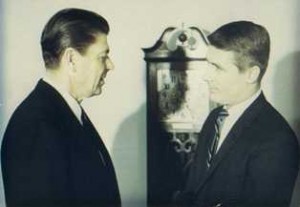
The political career and the possible future presidency of Ed Reinecke came tumbling down as his political foes made a big to-do over his use of office stationary for personal benefit. It would be hard for me to imagine how the Reinecke’s could do anything wrong. Upon hearing the news, several handwritten notes to me on stationary containing his seal of office, fell into our front room fireplace. By the time I set my glass of wine down and found the poker, they where pretty much ashes. I could just imagine all sorts of political skullduggery that could have come from their disclosure, as they disappeared.
Those who had much to gain in denting the armor of Ronald Reagan, would settle for the political blood of his heir, Ed Reinecke. Ed and Jean would walk away with their heads held high returning to the private sector, having had their fill of public office.
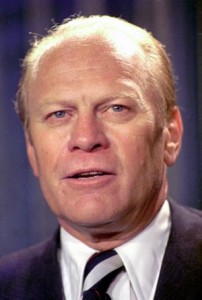 “Hey John, you wanna meet Ford?” asked my buddy Neil Bogart in 1977. “Ford Who?” I asked as he explained he was inviting President Ford to visit his home in Beverly Hills and I would be among the chosen few who would be in attendance. “I don’t know how much time we’ll have, it might just be a handshake” said Neil. And so it was “just a handshake” as Neil ushered me over to shake Ford’s hand. He was taller than I had expected. A smile never left his face, his eyes giving full attention to both of us as we merely shook hands. I remember him saying something about how much he appreciated California’s lack of humidity. It was only a few seconds and I would soon excuse myself and leave the gathering as I headed home to change into some beach clothes and head off to Paradise Cove.
“Hey John, you wanna meet Ford?” asked my buddy Neil Bogart in 1977. “Ford Who?” I asked as he explained he was inviting President Ford to visit his home in Beverly Hills and I would be among the chosen few who would be in attendance. “I don’t know how much time we’ll have, it might just be a handshake” said Neil. And so it was “just a handshake” as Neil ushered me over to shake Ford’s hand. He was taller than I had expected. A smile never left his face, his eyes giving full attention to both of us as we merely shook hands. I remember him saying something about how much he appreciated California’s lack of humidity. It was only a few seconds and I would soon excuse myself and leave the gathering as I headed home to change into some beach clothes and head off to Paradise Cove.
As owner of KCDA radio and a resident of north Idaho, in 1985 I was surprised to get a call from the White House asking if I could consider being a Reagan nominee for a seat on the Federal Communications Commission. I had been nominated by the presidents “favorite senator” Paul Laxalt of Nevada. It came as a shock to me because I had never been contacted by anyone in government, including the senator’s office, prior to this.
In a conversation that lasted for at least and hour, I readily could see the government’s investigative efforts had produced about as much about me as I could. Before it was over, 300 leaders of broadcast, music and politics contacted the white house showering me with praise. “You’re squeaky clean, just get back to me by the end of the week and let me know we can count on you” as he went on to explain I would also be required to place my broadcast interest in a blind trust.
Within hours, Irwin Molasky, called from Las Vegas saying how pleased and excited he was “for both of us” that I was being considered for the coveted FCC position. Both he and son Andrew lobbied for my attention to the cellular telecommunications industry. Andrew assured I should not concern myself divesting myself of my holdings in radio, “I’m sure they can only increase in value if you go to Washington”.
Media inquiries began, every local, regional and national press publication flooded my cramped office at KCDA. Only the Hagadone controlled Coeur d’Alene Press failed to report how their competitor was in the news. They had long used their unfair advantage to penalize and reward and I was considered an enemy when I refused his offer to purchase my KCDA with a bonus – a one way ticket back to California. I reminded Duane Hagadone, FCC regulations would prevent him from adding an FM to his AM radio/daily newspaper combo, grandfathered from years earlier. “That’s no problem, we have a way round that”, he said without elaborating. Little did I realize then, lawyers & regulators can interpret the law a dozen different ways to make it work for those who have enough money to pay for it.
The white house faxed me copy’s of each letter received supporting my nomination. My presence was requested for an in-person white house interview leading into the Memorial Day holiday in the nation’s capitol. I rushed to be properly attired in the capitol of correctness. I had long chosen comfortable clothing and loathed the suffocation of a suit and tie, but I bought two suits that I would never wear again.
It had been more than ten years since seeing Grandma Rook, now past her 100th year and confined in a Hagerstown, Maryland nursing home, I planned my trip to include a few days with her.
As just a toddler and a product of a broken home, it was my grandmother Hannah, who took over the task of becoming my mother. The example she set provided guidance for the remainder of my life.
Only in recent years did I learn she also was the product of a broken home before the turn of the century. I have no knowledge of where she gained her goodness, only that her Christian faith was evident. Led by her strong but soft voice she ushered me into a religious walk that would give me strength and character to mold my life. Seldom have I ever forgotten Hannah and the lesson’s she provided.
Having passed the century mark in age, I found myself sitting by her bedside in the final days of her long life when she motioned for my hand to hold. “Johnny” she said, “You’ve always been a giver in a world of takers”. It was then for the first time in my life that I realized why I derived such joy in giving and was uncomfortable with receiving. I loved heaping praise on others but always found it difficult to accept it in return. Giving direction and praise to talented performers was easy for me. As a performer in the days before I became a director, accolades embarrassed me. I enjoyed my place back stage, behind the curtain, being on stage myself was not enjoyable.
Over the years I had regular telephone conversations with grandma Hannah who had become “Mommie Rook” to her grand children. I always remembered her with flowers on special occasions, her birthday, Easter and Christmas. It was something her sons seldom did, but her grandson Max and I never missed doing. My personal visit with her would be the last one. She died at 102 years of age.
As meetings go, my interview in the white house was short, not more than an hour.
Quizzed by white house aids, I was asked what I thought of the “fairness doctrine”. In my answer I sealed any chance I would be the nominee advanced by President Reagan. I explained I thought the Fairness Doctrine was indeed fair, that without some regulatory safeguards that would guarantee fairness, the industry could easily be without a voice of both sides of an issue. “What do you think of the National Association of Broadcasters”, I was asked. “They represent only those who pay the most dues”, I said. “Small broadcasters have no voice at the NAB”, I added.
I’d learn later big media had already been guaranteed by the White House, the Fairness doctrine that had worked well over the years would become history. Those who used their influence to have in taken away were now on a roll. Enter deregulation without safeguards, where the rich and powerful drive the little guy out of business. It wouldn’t just happen to the media, it would spread to all avenues of big business.
That afternoon I was introduced briefly to Senator’s Ted Kennedy and Jessie Helms. As I began to tell Kennedy of my earlier handshake with his brother the President, he seemed bored and while never looking at me eye to eye excused himself with “well good luck to you.” Senator Helms asked a question about my views of deregulating “carriers”, that I took to mean the plan to deregulate telephone services, before I could answer he immediately told me his view and like the Massachusetts senator, excused himself leaving me sitting by myself in a chair across from his desk. Thinking he might be returning, I just sat waiting until five minutes later a young man entered asking “are you still here?”
I felt totally out of place and while catching a cab back to my hotel suite, I yearned to return home to the Idaho.
